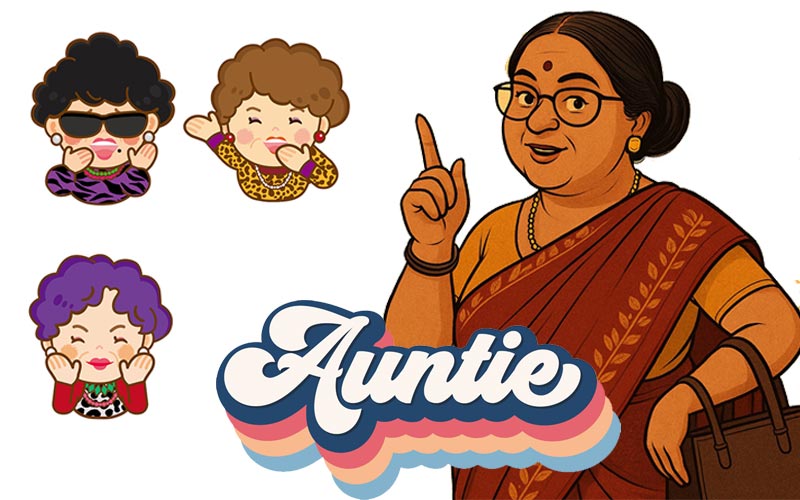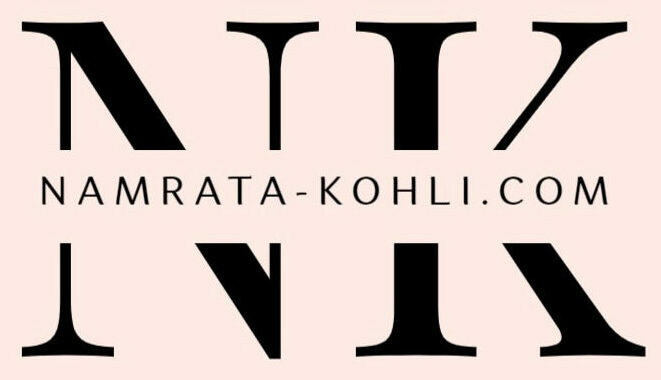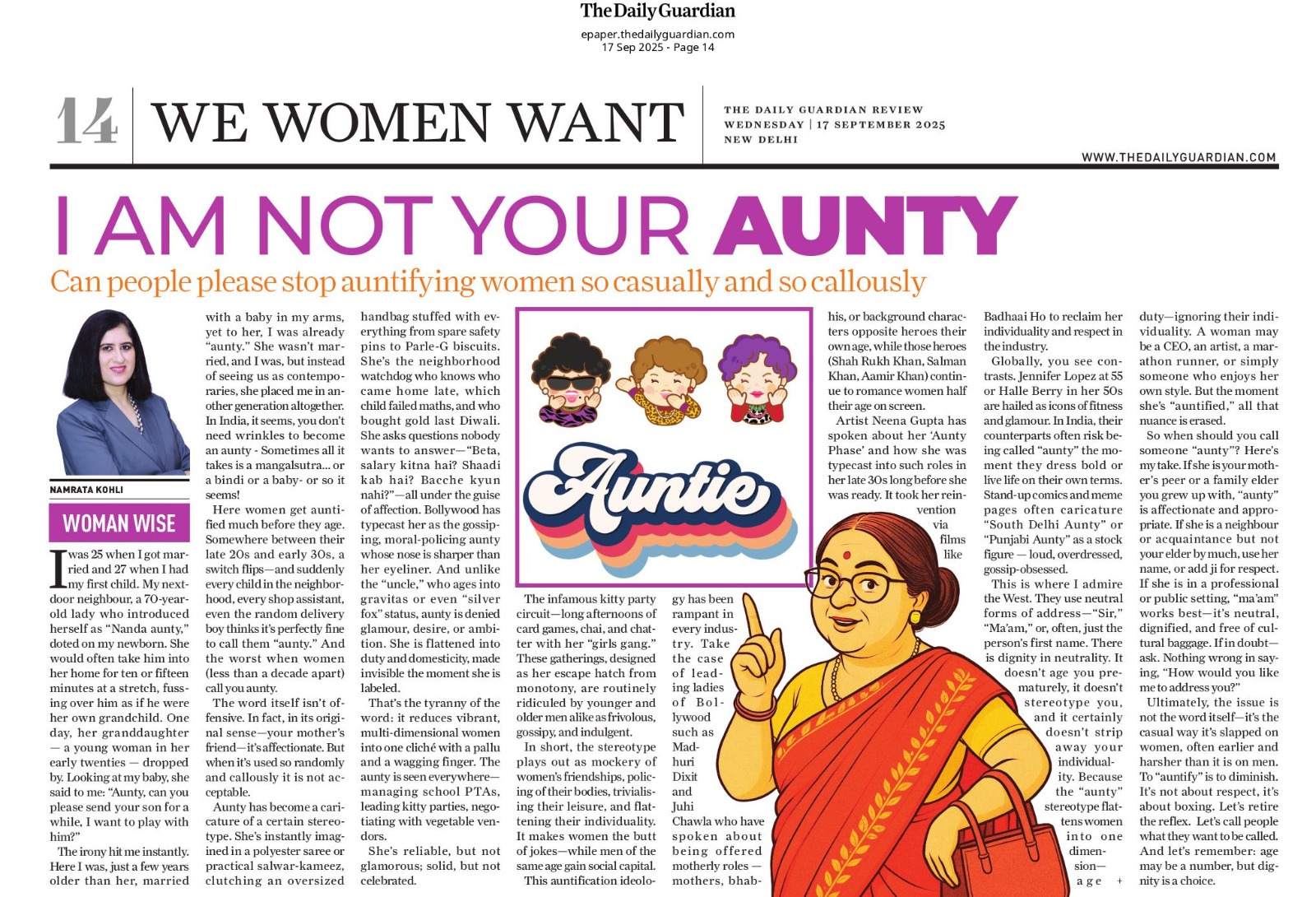Can people please stop auntifying women so casually and so callously
I was 25 when I got married and 27 when I had my first child. My nextdoor neighbour, a 70-yearold lady who introduced herself as “Nanda aunty,” doted on my newborn. She would often take him into her home for ten or fifteen minutes at a stretch, fussing over him as if he were her own grandchild. One day, her granddaughter — a young woman in her early twenties — dropped by. Looking at my baby, she said to me: “Aunty, can you please send your son for a while, I want to play with him?”
The irony hit me instantly. Here I was, just a few years older than her, married with a baby in my arms, yet to her, I was already “aunty.” She wasn’t married, and I was, but instead of seeing us as contemporaries, she placed me in another generation altogether. In India, it seems, you don’t need wrinkles to become an aunty – Sometimes all it takes is a mangalsutra… or a bindi or a baby- or so it seems!
Here women get auntified much before they age. Somewhere between their late 20s and early 30s, a switch flips—and suddenly every child in the neighborhood, every shop assistant, even the random delivery boy thinks it’s perfectly fine to call them “aunty.” And the worst when women (less than a decade apart) call you aunty.
The word itself isn’t offensive. In fact, in its original sense—your mother’s friend—it’s affectionate. But when it’s used so randomly and callously it is not acceptable.

Aunty has become a caricature of a certain stereotype. She’s instantly imagined in a polyester saree or practical salwar-kameez, clutching an oversized handbag stuffed with everything from spare safety pins to Parle-G biscuits. She’s the neighborhood watchdog who knows who came home late, which child failed maths, and who bought gold last Diwali. She asks questions nobody wants to answer—“Beta, salary kitna hai? Shaadi kab hai? Bacche kyun nahi?”—all under the guise of affection. Bollywood has typecast her as the gossiping, moral-policing aunty whose nose is sharper than her eyeliner. And unlike the “uncle,” who ages into gravitas or even “silver fox” status, aunty is denied glamour, desire, or ambition. She is flattened into duty and domesticity, made invisible the moment she is labeled.
That’s the tyranny of the word: it reduces vibrant, multi-dimensional women into one cliché with a pallu and a wagging finger. The aunty is seen everywhere— managing school PTAs, leading kitty parties, negotiating with vegetable vendors.
She’s reliable, but not glamorous; solid, but not celebrated.
The infamous kitty party circuit—long afternoons of card games, chai, and chatter with her “girls gang.” These gatherings, designed as her escape hatch from monotony, are routinely ridiculed by younger and older men alike as frivolous, gossipy, and indulgent.
In short, the stereotype plays out as mockery of women’s friendships, policing of their bodies, trivialising their leisure, and flattening their individuality. It makes women the butt of jokes—while men of the same age gain social capital.
This auntification ideology has been rampant in every industry. Take the case of leading ladies of Bollywood such as Madhuri Dixit and Juhi Chawla who have spoken about being offered motherly roles — mothers, bhabhis, or background characters opposite heroes their own age, while those heroes (Shah Rukh Khan, Salman Khan, Aamir Khan) continue to romance women half their age on screen.
Artist Neena Gupta has spoken about her ‘Aunty Phase’ and how she was typecast into such roles in her late 30s long before she was ready. It took her reinvention via films like Badhaai Ho to reclaim her individuality and respect in the industry.
Globally, you see contrasts. Jennifer Lopez at 55 or Halle Berry in her 50s are hailed as icons of fitness and glamour. In India, their counterparts often risk being called “aunty” the moment they dress bold or live life on their own terms. Stand-up comics and meme pages often caricature “South Delhi Aunty” or “Punjabi Aunty” as a stock figure — loud, overdressed, gossip-obsessed.
This is where I admire the West. They use neutral forms of address—“Sir,” “Ma’am,” or, often, just the person’s first name. There is dignity in neutrality. It doesn’t age you prematurely, it doesn’t stereotype you, and it certainly doesn’t strip away your individuality. Because the “aunty” stereotype flattens women into one dimension—age + duty—ignoring their individuality. A woman may be a CEO, an artist, a marathon runner, or simply someone who enjoys her own style. But the moment she’s “auntified,” all that nuance is erased.
So when should you call someone “aunty”? Here’s my take. If she is your mother’s peer or a family elder you grew up with, “aunty” is affectionate and appropriate. If she is a neighbour or acquaintance but not your elder by much, use her name, or add ji for respect. If she is in a professional or public setting, “ma’am” works best—it’s neutral, dignified, and free of cultural baggage. If in doubt— ask. Nothing wrong in saying, “How would you like me to address you?”
Ultimately, the issue is not the word itself—it’s the casual way it’s slapped on women, often earlier and harsher than it is on men. To “auntify” is to diminish. It’s not about respect, it’s about boxing. Let’s retire the reflex. Let’s call people what they want to be called. And let’s remember: age may be a number, but dignity is a choice.




